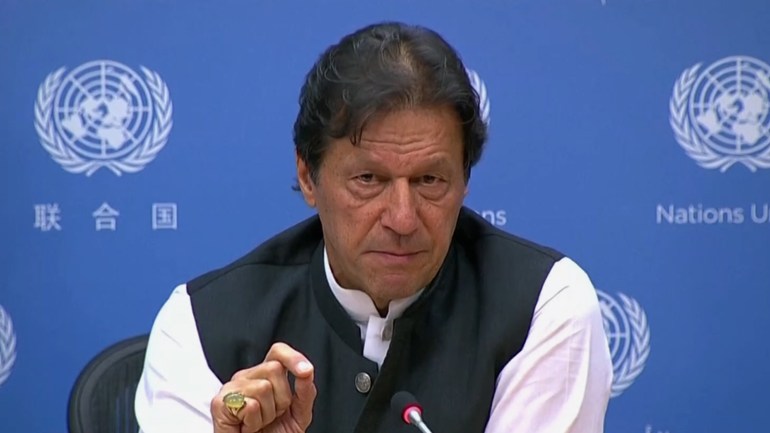ISLAMABAD -
After days of waiting and controversy that dominated the Pakistani street, the Federal Supreme Court of Pakistan has ruled that the decision of Qassim Khan Suri, Deputy Speaker of Parliament, to prevent the vote on the motion of no confidence in the government on the 3rd of April is illegal.
It also ruled that the subsequent decisions to dissolve Parliament and the government and call early elections were null and illegal.
According to the Pakistani newspaper Dawn, all five judges were against the speaker's decision.
Accordingly, the Pakistani parliament will return to work again, and a vote of no confidence will take place next Saturday, corresponding to the ninth of this month, at a maximum of 10:30 am local time, as stated in the court's decision.
The deputy speaker of Parliament had taken that decision on the third of April, justifying this by saying that the motion to withdraw confidence is unconstitutional “because of the existence of a conspiracy and external interference,” as he described it, and accused the opposition of treason and conspiracy with foreign parties to overthrow the government, which the opposition denied.
The opposition had previously submitted a motion for a vote of no confidence in Imran Khan and his government through its leader in Parliament, Shahbaz Sharif, on the eighth of last March, after obtaining the signature of 84 deputies.
Pakistani Prime Minister Imran Khan has limited options ahead of the vote of no-confidence in his government (Al-Jazeera)
A victory for the opposition and disappointment for the government
Speaking to the media after the ruling, the leader of the Pakistan Muslim League (Nawaz Sharif) and opposition leader in the Pakistani parliament, Shahbaz Sharif, commented that the court certainly fulfilled the expectations of the people.
For his part, the leader of the Pakistan People's Party Bilawal Bhutto Zardari described the Supreme Court ruling as "a victory for democracy and the constitution."
"Pakistan's institutions and constitution have been preserved, and God willing, the recall process will now end and we will conduct electoral reforms and head towards fair and transparent elections," he said.
Maryam Nawaz Sharif, vice president of the Umma League, congratulated the "supremacy of the constitution" and said that Shahbaz Sharif would become the next prime minister.
In contrast to the opposition, the reactions of members of the government were different, with Information Minister Fouad Chaudhry saying that the "unfortunate decision" would exacerbate the political crisis in the country.
"The immediate elections could have brought stability to the country," he wrote on Twitter. "Unfortunately the importance of the people has been overlooked."
While PTI senator Faisal Javid said the prime minister "will continue to fight for his country" and asked the public not to panic, saying that "the prime minister will soon announce his next strategy".
End of Imran Khan's rule
The court's decision, which was issued on Thursday, indicates the difficult current position of Imran Khan's government, as the opposition is expected to succeed this time in withholding confidence in him and his government.
In this context, political and strategic analyst Abdul Karim Shah says, in an interview with Al Jazeera Net, that matters are simply clear, "Prime Minister Imran Khan (tomorrow) will be withholding confidence (tomorrow) Saturday during the scheduled parliament session, and immediately after that Shahbaz Sharif will be appointed as Prime Minister."
For his part, political analyst Fazal Bangash believes that while no prime minister in Pakistan has completed a full five-year term, Imran Khan will be the first to be impeached in a vote of no confidence.
Bangash added to Al Jazeera Net, "The Supreme Court decided that Khan's government violated the constitution and ordered a vote of no-confidence on Saturday morning. Therefore, for a year and a half - which is the remaining term for the government - the opposition is expected to take over the reins of government, and Shahbaz Sharif will be the prime minister."
According to the same analyst, "All of Imran Khan's allegations about the foreign conspiracy that he resorted to to gain popularity in the Pakistani street are in vain."
As for political analyst Rayatullah Farooqi, he said that the government has no choice now to depart from this decision, and if the voting is not completed (tomorrow) Saturday for any reason, this may be a violation of the court ruling.
In this case, Farooqi told Al Jazeera Net, "Imran Khan has only two constitutional options: the first must leave his post if the motion of no confidence succeeds, and the second resign before the motion of no confidence.
Analysts expect Imran Khan to resort to filing cases against opposition leaders before the date of his impeachment (Reuters)
Imran Khan confronts the opposition
On the other hand, political affairs expert Muhammad Mahdi says, "It remains to be seen whether the prime minister will resign or not, because his removal and the Speaker and his deputy from their posts is now written on the wall," which is expected.
As for the analyst Fazl Bangash, he expected Imran Khan to play his second card as a surprise when he and all members of his party would resign from Parliament, which would leave nearly 150 empty seats inside it.
Consequently, it will be difficult to hold special elections to fill those seats, which may necessitate the need for early elections.
Pangash said Khan could take action until Saturday based on recommendations from his legal advisers, such as bringing cases in court against the opposition in relation to the foreign conspiracy, and presenting any evidence he might have, meaning he will play all the cards at his disposal in the coming days.
But the analyst suggested that the prospect of Imran Khan being "expelled" by opposition parties, former allies and dissidents from within his party in Parliament, would damage his ability to garner widespread support ahead of the upcoming elections.

